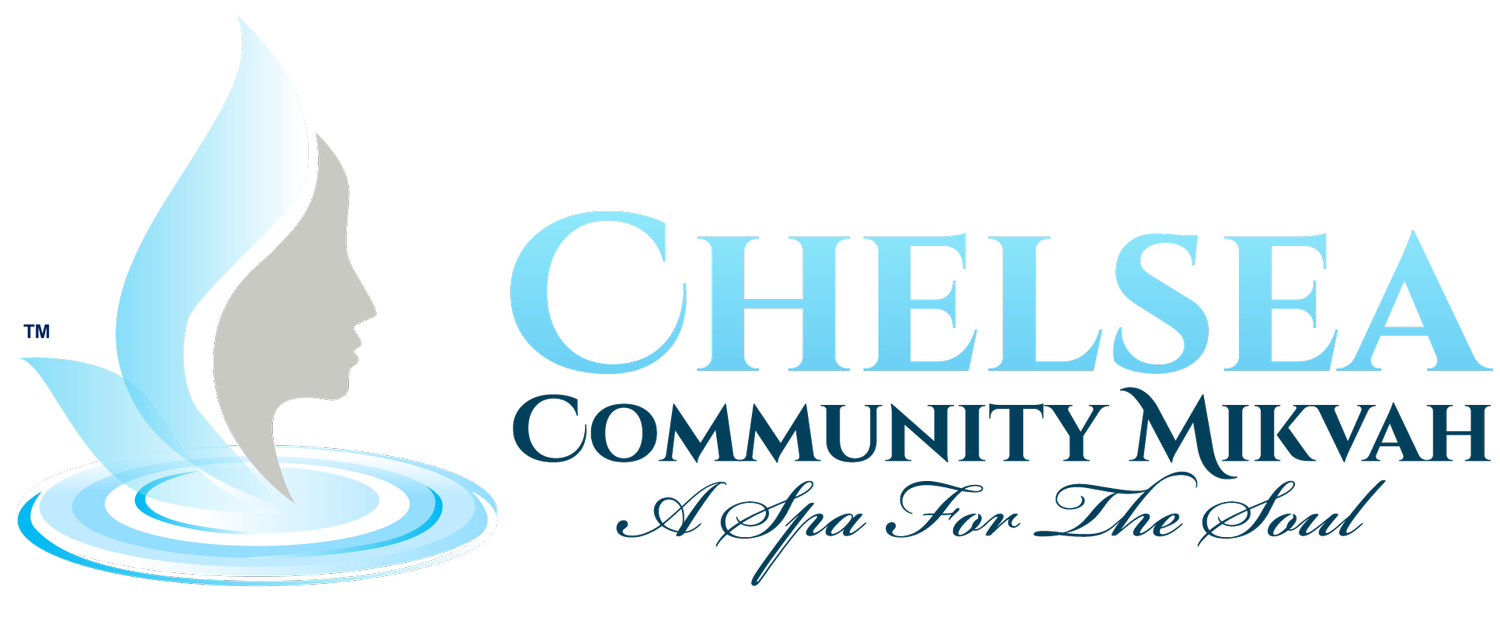Mikvah Guide & Preparation Checklist
Jewish marriage sanctifies man and woman. Mivkah observance introduces times of separation and reunion as part of a cycle in married life. Separation begins with the onset of the menstrual flow. It is a time when the depth of the husband-wife relationship is expressed without physical intimacy. It is a period of anticipation and preparation for Mikvah immersion. The reunion that follows holds the highest potential for sanctity in marriage.
(Important note: in order to have a Halachically Kosher Mikvah immersion, a minimum of 12 days of abstinence must be kept- a minimum of 5 designated flow days and the 7 white days. Even if a woman's cycle lasts shorter than 5 days. If a women flow last more than 5 days, there may be additional days necessary than the minimum 12 days)
Mikvah immersion is entrusted to the woman. It is a moment of special closeness in a woman’s relationship with G-d. It is an auspicious time for her personal prayers and requests to be granted. This checklist is useful prior to immersion. Complete understanding and observance of these laws necessitates in-depth study and subsequent review on a woman-to-woman basis, in private or group settings, with an open sharing of knowledge and experience. It is our prayer that the practice of Mikvah will enrich the dynamics of your relationship and benefit your family.
Prerequisites For Immersion
Shortly before sunset, on the day your period ends (at least the fifth day of menstrual cycle), make the initial internal examination, (Hefsek Tahara & Moch Dochuk ), using a soft white checking cloth.
Begin using white undergarments and bed linens.
On the morning following the successful initial internal examination, begin counting the Seven (7) Days.
Make the required daily examinations (Bedikos).
Immersion takes place the following week, after nightfall, on the same day of the week, as the initial examination. (For example, if you make the initial examination on Sunday before sunset, you will immerse on the following Sunday night.)
Call the Mikvah a few days in advance to check if an appointment is necessary and whether a preparation room, with a bath and supplies, is available.
If you are traveling, or are away from home, log onto www.mikvah.org to find a Mikvah near you.
If the time of your immersion falls on the Sabbath (Friday night), Saturday night, or a Jewish Holiday, discuss the special preparations and arrangements needed for these occasions.
Prior to immersion, special precautions are taken to ensure that no intervening substances will separate any part of your body from the waters of the Mikvah.
Bandages, cast, stitches, temporary dental work, IUD’s and unusual skin conditions require rabbinic consultation.
Cutting, shaving or waxing of hair should be done a few days prior to immersion.
Questions concerning staining and other personal matters relating to mikvah observance are quite common. The mikvah attendant, or your local Rebbetzin, can obtain confidential replies to private halachic questions, or refer you directly to a Rabbi experienced in discreetly addressing these sensitive issues.
On The Day Of Immersion
It is advisable to refrain from kneading dough, using glue, paint or any other substance which is difficult to remove
Meat and chicken should not be eaten, except in honor of the Sabbath or a Jewish holiday.
It is best to begin your preparations before sunset.
You should not eat between the time of your bath and your immersion.
Preparation Checklist
During your preparations, please feel free to call on the Mikvah attendant for guidance with any questions you may have.
Remove jewelry, contact lenses (bring glasses to view preparations clearly), false teeth, false eyelashes, false nails and band-aids.
Remove make-up and skin lotions. Pay special attention to mascara and eyeliner.
Remove nail polish. Cut, file and clean finger and toe nails.
Brush teeth; no particles of food should remain between teeth. Use unwaxed dental floss, only if you are sure it will not get caught. Rinse mouth with water.
Bathe with warm water. Wash entire body thoroughly. Use soap and washcloth or loofah sponge
Give careful attention to the following: ears and earring holes, nose, corner of eyes, eyelashes, eyebrows, entire breast, navel, genital area, also internally, underarms, elbows, knees, back, soles of feet, under chin, between toes, thighs and other folds of the skin (this is halacha).
Smooth hard skin and calluses. Soften and remove dry scabs provided bleeding will not occur.
Remove protruding splinters.
Wash hair with shampoo, without conditioners.
Shower or rinse thoroughly with a non-moisturizing soap or body wash.
Blow nose
Comb all hair while still wet.
If preparations are made at home, shower and recomb your hair at the mikvah.
Check your body, visually and by touching, to ensure that it is free of intervening substances.
Use the bathroom if necessary, be sure to wash all areas to ensure clean of toilet tissue, etc and re comb pubic hair
Do not dry yourself.
Signal to the Mikvah attendant that you are ready.
Don a robe and slippers while you wait for the mikvah attendant. She will discreetly lead you to the mikvah for a private immersion, to pronounce it kosher, and to answer any questions you may have.
During The Immersions
Enter the Mikvah and immerse once.
Recite the blessing:
BO-RUCH A-TOH A-DOH-NOI E-LO-HAI-NU ME-LECH HO-O-LOM
A-SHER KI-D’-SHO-NU B’-MITZ-VO-SOV V’-TZI-VO-NU AL HA-T’-VI-LOH.
Blessed are you G-d, our G-d, King of the Universe, who sanctified us with Your commandments concerning immersion. Immerse again according to custom. If you’re not aware of a family custom, the accepted majority custom is to immerse three times. One time before the blessing and two times consecutively after reciting the blessing.
Upon completion many women say the following:
Y’-HI RO-TZON MI-L’-FO-NEH-CHOH A-DOH-NOI- E-LO-HAI-NU VAI-LO-HAI A-VO-SAI-NU SHE-YI-BO-NEH BAIS HA-MIK-DOSH BI-M’-HAI-ROH V’-YO-MAI-NU V’-SAIN CHEL-KAI-NU B’-SO-RO-SEH-CHOH.

